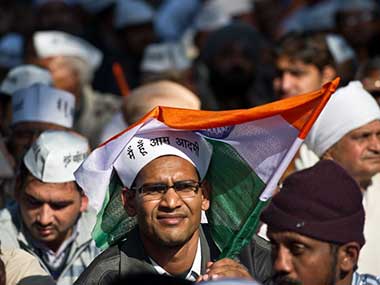At a time when Westminster-style democracy is facing an existential crisis in its own backyard with more and more people, especially the middle class, opting out of mainstream politics in England, the apparent resurgence of political activism in India symbolised by the Aam Aadmi Party’s plucky political debut is surely significant. But sceptics with slightly longer memories of the Indian political scene than the television soundbite era allows may be forgiven for taking some of the post-AAP claims with a pinch of salt. To my mind, the most extraordinary of these is crediting the urban middle class with the “flowering” and “coming-of-age” of Indian democracy supposedly represented by AAP. The fact is that the middle class is part of the problem because of which Indian politics reached such a pass that we needed a brand new party to re-energise it. The real heroes, on the other hand, are the millions of working class Indians who have kept the show going for 60 years by religiously turning up to vote at every election seeking change through the ballot box when the middle class, feigning ‘alienation’ stayed home. [caption id=“attachment_1326565” align=“alignleft” width=“380”]  AFP[/caption] It is a universal middle class trait to portray itself as an agent of progressive change, though in reality it is instinctively status-quoist, pushing for reform only when it suits its own interests. In Britain, middle class “disengagement" from politics is this season’s biggest story after some of the country’s most high-profile middle class public figures, including the celebrity comedian and broadcaster Russell Brand, proudly confessed to not voting in elections because they find the choices “unappetising". It has echoes of the Indian middle class’s political behaviour historically marked by large-scale absenteeism at elections and an aversion to “dirtying" its hands. The middle class is also reluctant to rock the boat or push for any political or economic change whose consequences are not predictable. The comatose state of the Indian Left is an enduring illustration of the middle class voters’ risk-averse approach. So, the post-AAP wave of self-congratulation (metaphorical hi-fives, and “we-did-it”) sweeping the middle class redoubts sits oddly with its role in propping up a reactionary political culture. There is only one issue on which the middle class has ever taken a stand: price rise. That’s the one safe platform on which any political party can hope to win enough middle class votes any day. Indira Gandhi famously bounced back into power in 1980 in what came to be known as “onion elections" fought on the agenda of containing the runaway rise in the price of onion. Again, in 1998, the Bharatiya Janata Party lost the Delhi elections to the Congress on the issue of onion prices. So long as the middle class is assured of a decent wage, cheap onions, a semblance of social mobility and not-too-much corruption it is happy to keep its head down without worrying too much about larger issues such as the nature of polity or future of democracy. It is only when the normal rhythm of its daily life is threatened that it is jolted into action; and there is a scramble to jump on to the nearest passing bandwagon offering change. At the risk of being a party-pooper, I would suggest that Delhi’s middle class plumped for AAP not to revolutionise politics, but because the party’s agenda happened to resonate with its own immediate concerns around corruption, price rise and transparency. Besides, some see AAP as a vehicle to launch their own political careers. It is true that today the Indian middle class is much larger and more aspirational. Perhaps even more angry than before. But whether it has finally decided to use its deep anger to change the face of Indian politics, as being claimed, remains debatable. There have been similar flashes in the pan before– only for the middle class to revert to its default comfort zone after the event. Jayaprakash Narayan’s call for “Total Revolution" in 1974 against corruption, rising prices and social injustice brought large sections of the middle class –students, teachers, journalists, lawyers, rights activists—on to the streets in what remains perhaps the biggest show of people’s power in independent India. In 1977, the middle class turned out to vote with its feet against Indira Gandhi to punish her for imposing the emergency. That was the last time we saw middle class political activism on a notable scale—until Anna Hazare’s anti-corruption campaign which then morphed into AAP. It is being said that the younger generation of middle class professionals – AAP ’s backbone– is different and genuinely yearning for change. Well, we shall see but, meanwhile, the breathless celebration of middle class political activism has a whiff of the way fickle-minded cricket fans react when Team-India pulls off a shock victory after a long lean season. Barely weeks ago, the mood was so gloomy that it seemed Indian politics could go only one way—downhill. Suddenly, we are led to believe that India is on the cusp of a new dawn because a group of street fighters has won a local election in one corner of the country. As I pointed out in these columns recently, the European experience of what has come to be known as the phenomenon of the political “lone-ranger" tells us not to get too excited. The public anger over the global economic crisis spawned nearly a dozen AAP-style parties across Europe, all making spectacular debuts only to end up as just one more mainstream entity. Guess who their core supporters were?
The fact is that the middle class is part of the problem because of which Indian politics reached such a pass that we needed a brand new party to re-energise it
Advertisement
End of Article


)
)
)
)
)
)
)
)
)



